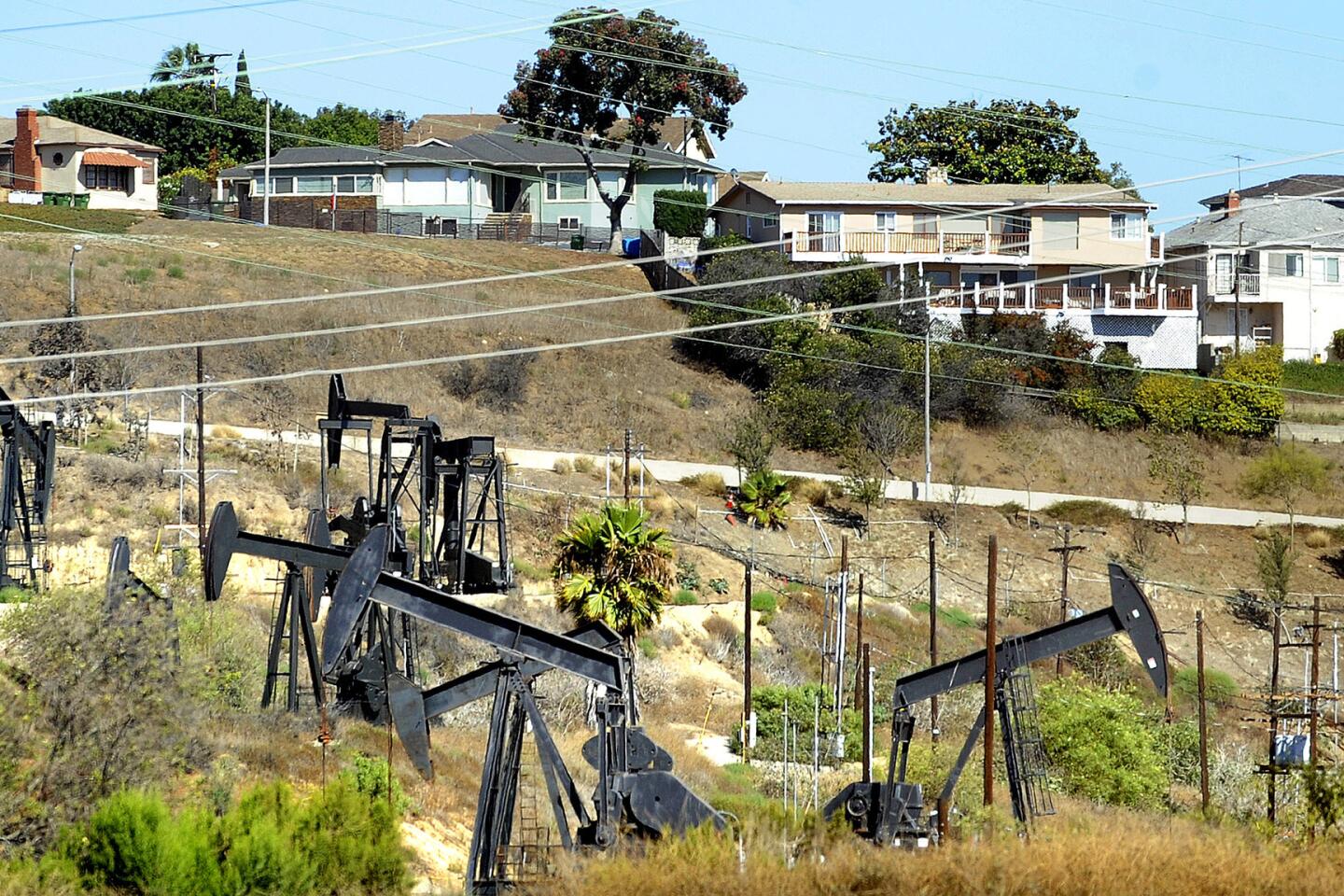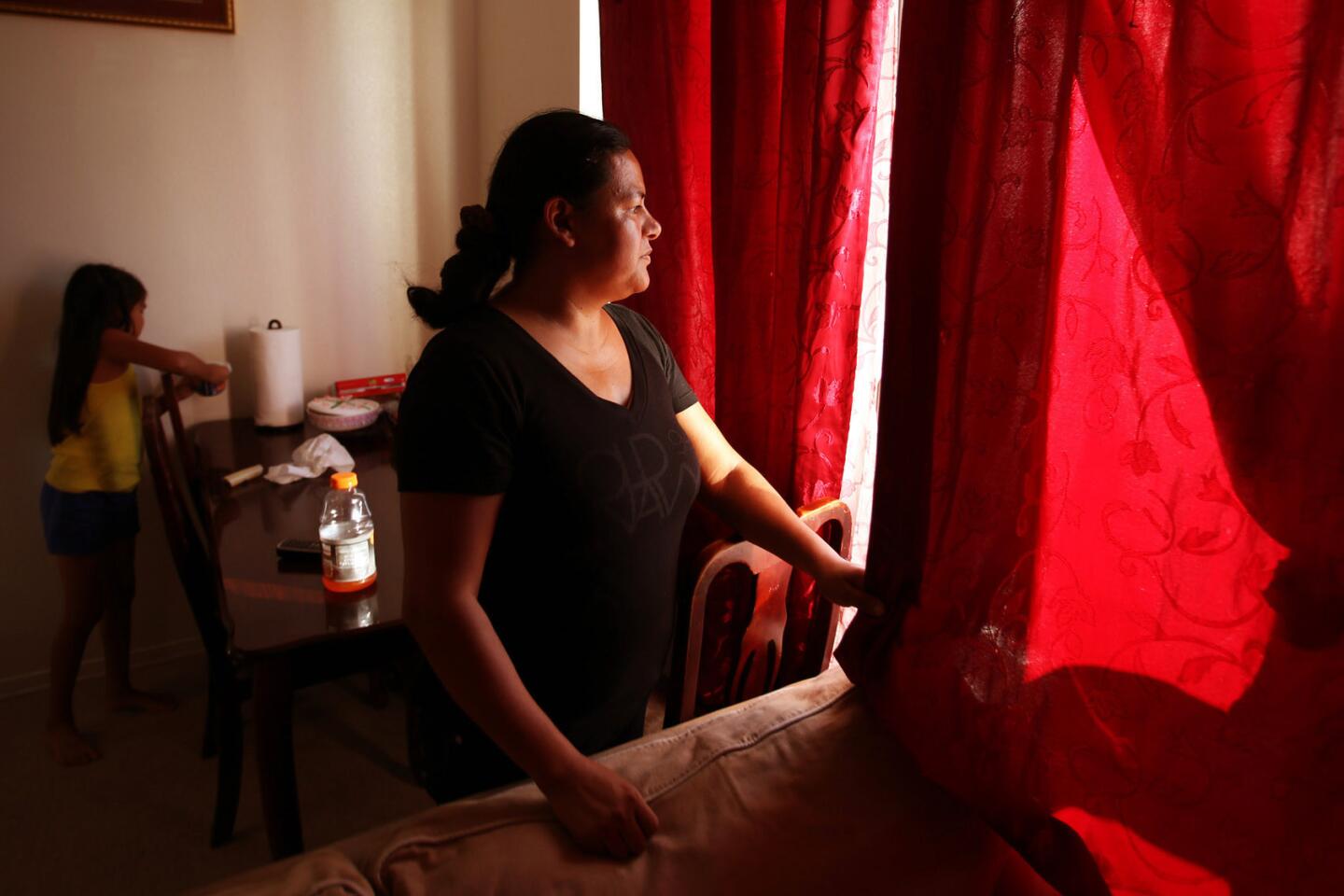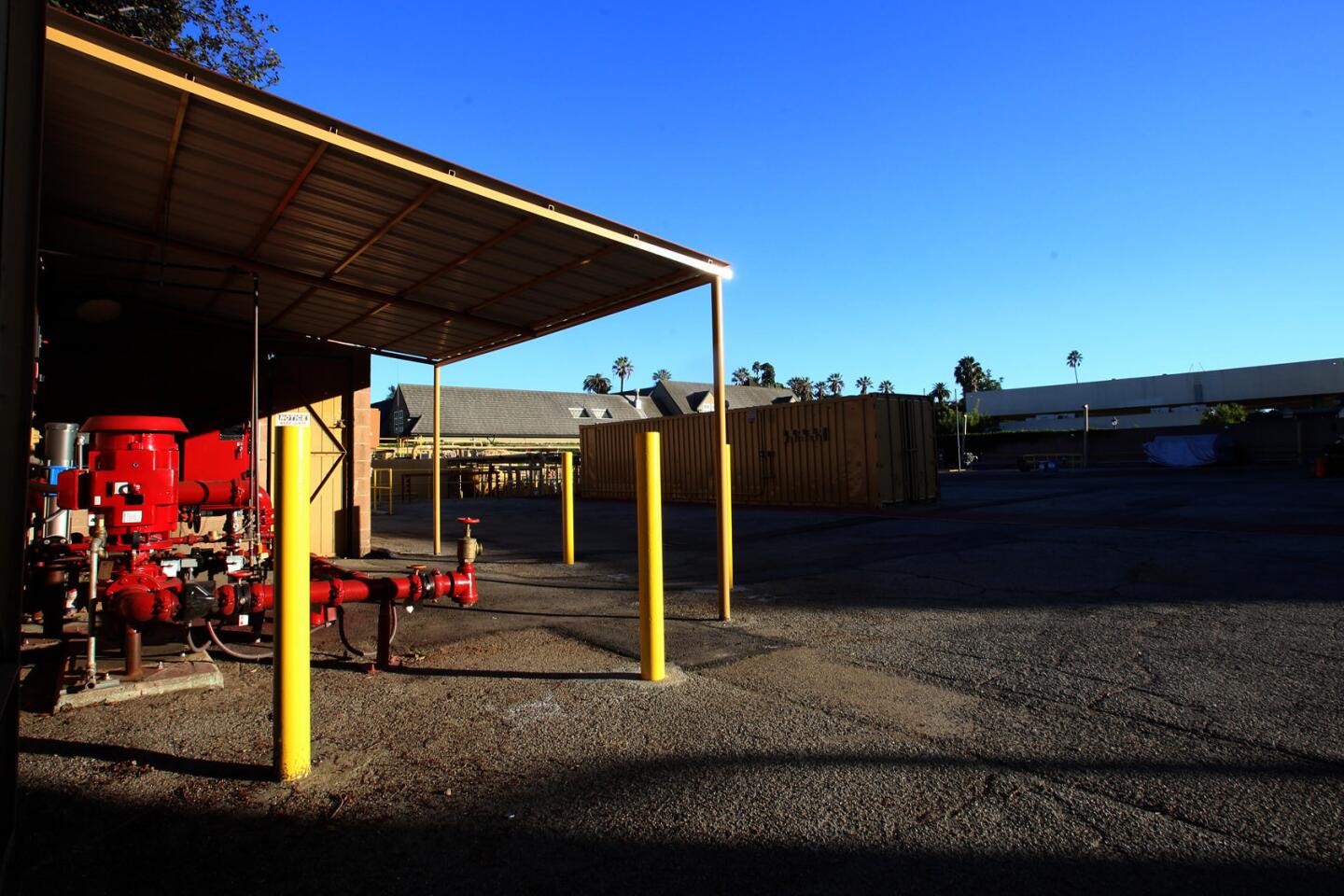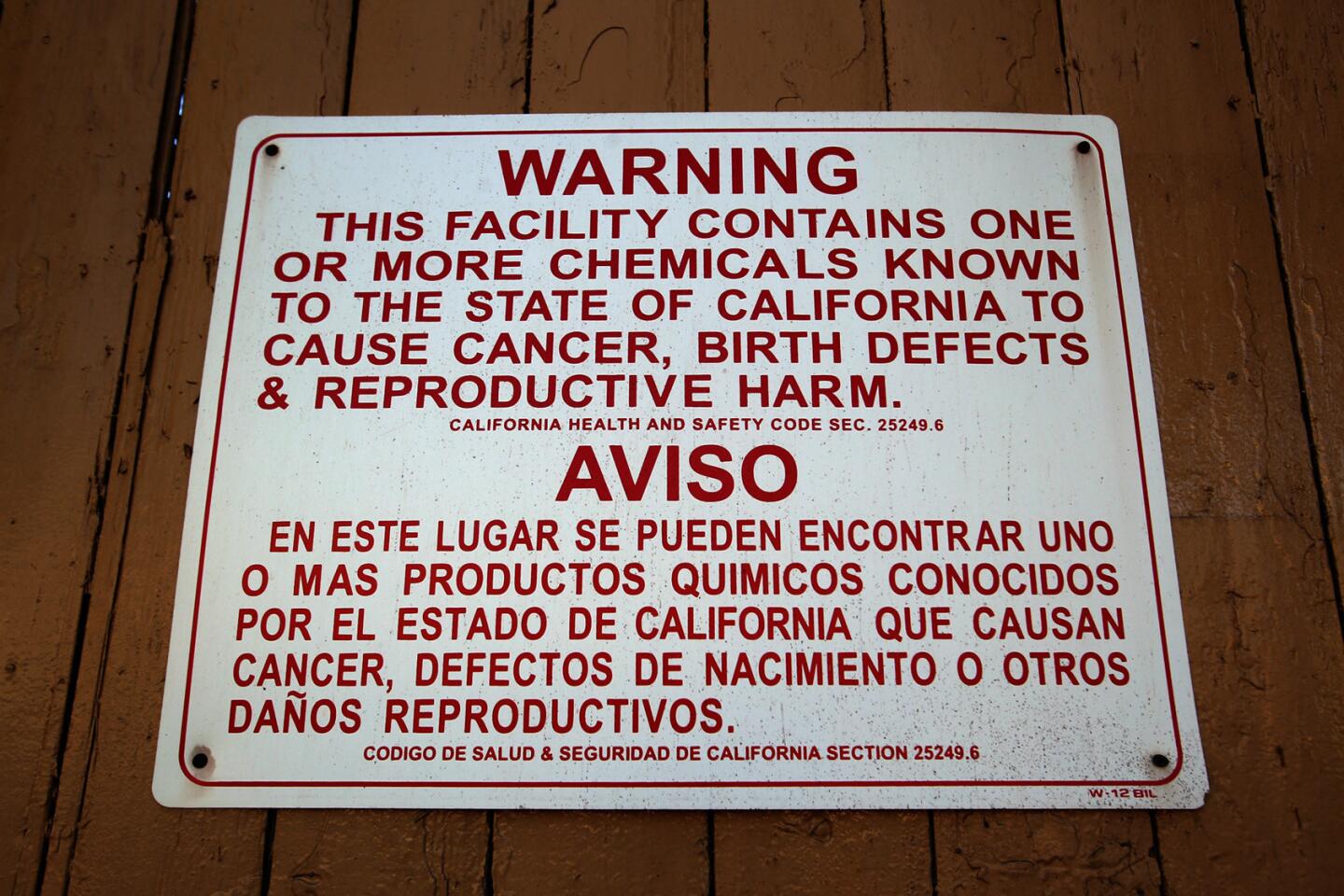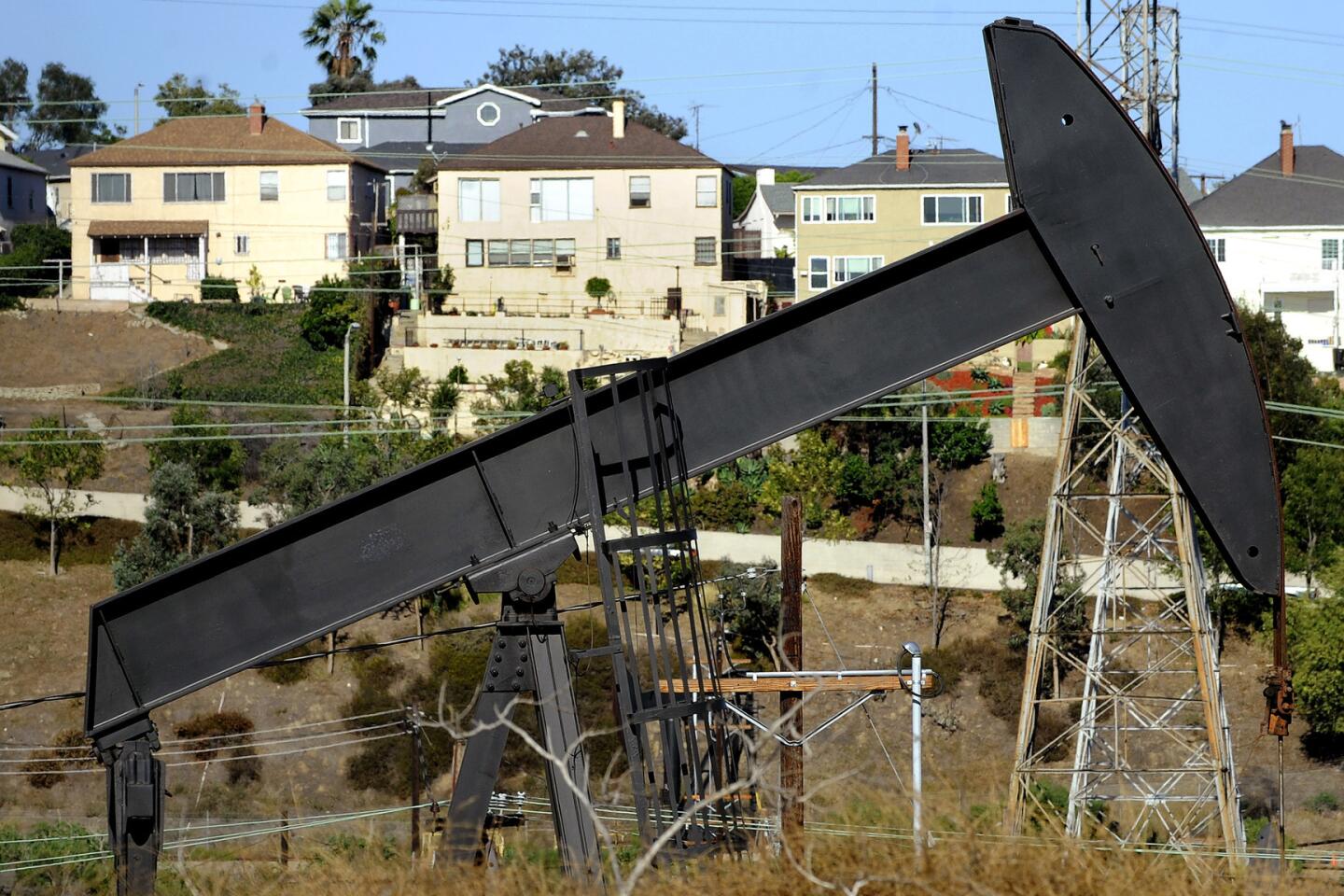L.A. officials set oil drilling terms but fail to enforce them
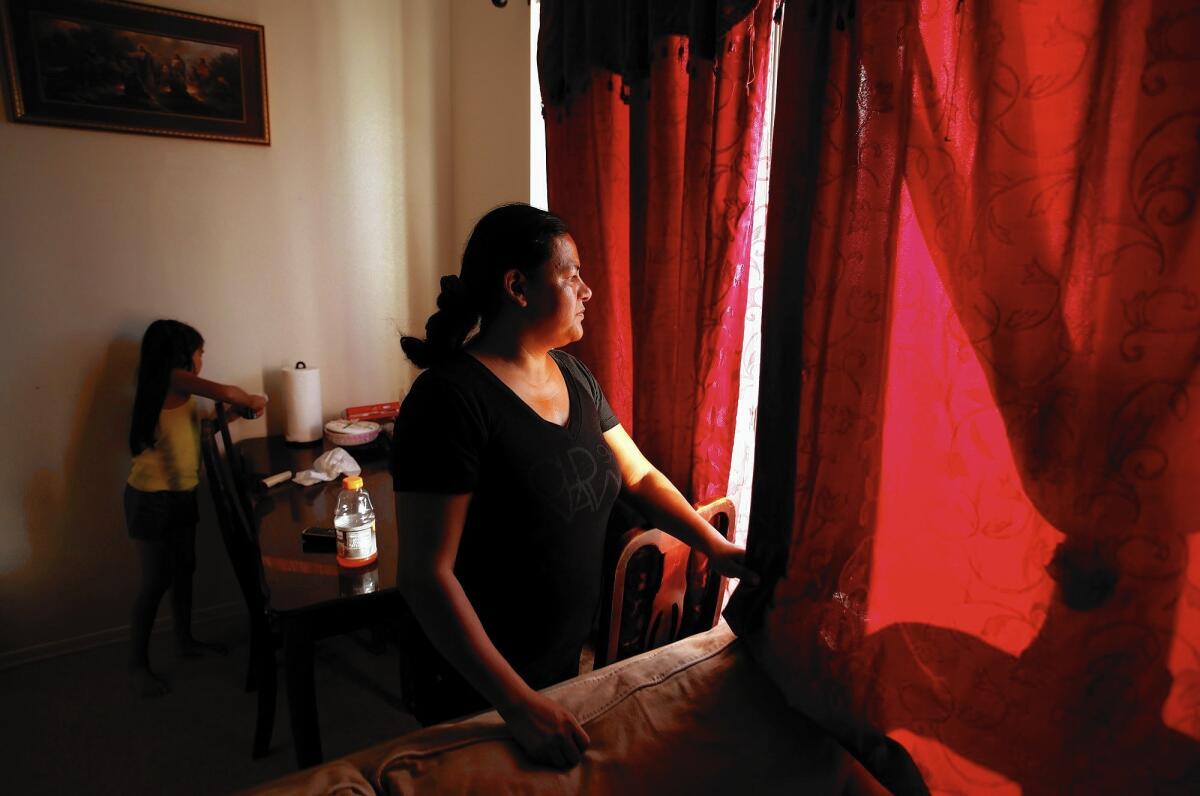
When oil companies wanted to drill wells at a South Los Angeles site decades ago, city planners set out a long list of requirements intended to ensure that oil production was âstrictly controlled to eliminate any possible odor, noiseâ and other hazards.
Nearly a half-century later, neighbors complained about a foul stench, headaches and nosebleeds. Hundreds of complaints were filed with regional air quality regulators.
Years after concerns first erupted, following a public outcry, the current operator of the site voluntarily suspended production. And the city attorney sued to prevent the firm, AllenCo Energy Inc., from resuming drilling, arguing it had created a âpublic nuisance.â
See the most-read stories this hour >>
But what the city didnât do as the problems arose was investigate whether AllenCo was complying with the requirements originally imposed by the city.
Los Angelesâ apparent lack of follow-through on its operating conditions, which The Times found in files in a government archive, points to broader weaknesses in city oversight of roughly 1,000 active wells across the city, many of them nestled near homes and schools.
In the past, city planners crafted rules on a case-by-case basis that were meant to minimize problems at each drilling site. But Los Angeles has no systematic way to ensure those requirements are being followed. City officials say they initiate investigations only in response to complaints.
Planning officials acknowledged in a report last year that they needed a new system to âmonitor and regularly enforce current conditions of compliance of existing oil and gas operations.â But so far, no such process has been established.
Environmental activists say those enforcement gaps underscore the need for reforms, especially as AllenCo presses to restart drilling.
Neighbors said they werenât aware of the requirements imposed by the city and took their grievances about odors to a regional air quality agency. But the Los Angeles Department of Building and Safety, which is responsible for investigating possible violations of city conditions, doesnât coordinate with that agency, according to building department spokesman David Lara. So it didnât receive the complaints that neighbors were filing with air quality regulators.
And Lara added that even if the odor complaints had come to his agency, its staff lacks the expertise to properly investigate such issues.
Liberty Hill Foundation program manager Daniela Simunovic, whose organization funds grass-roots groups concerned about environmental hazards, said the city hasnât taken responsibility for enforcing the conditions it places on oil facilities.
âOur city has fallen asleep at the wheel,â she said.
In a statement, AllenCo said it has âworked cooperatively with local, state and federal agencies to address concerns raised by the community.â It has spent more than $1 million on fines and improvements under settlements with regulators. The company also is trying to negotiate a settlement with City Atty. Mike Feuer, who said any deal to resume operations must protect the neighborhood.
Critics contend that AllenCo is not an isolated example but part of a chronic failure to hold oil companies to their promises. Community groups complain the city has failed to investigate alleged violations of operating requirements at other sites, including a facility on Jefferson Boulevard west of USC.
âIf the city wonât meet its responsibilities and use its powers when people get sick, as at AllenCo, then it means the whole system has imploded,â said Michael Salman, a West Adams resident who maintains the city has skirted legally mandated reviews of oil projects.
Councilman Gil Cedillo, who represents part of the South Los Angeles neighborhood near the site, said he had never seen the 1966 document that set operating conditions until The Times found it. He and his aides said they could have demanded action earlier if they had known about the requirements. âThis should have been posted on a wall or something for people to look at,â the councilman said.
Officials in the city planning department, which mandated the original conditions when the drilling site was approved, said they didnât need to get involved in the AllenCo case because other government agencies charged with regulating oil drilling were responding to complaints. The cityâs zoning authority âis limited in scope relative to those agencies and their police powers,â Chief Zoning Administrator Linn Wyatt wrote in an email.
Federal and county agencies were investigating the drilling operation when it shut down. The regional South Coast Air Quality Management District had repeatedly cited the company for violations, including failing to control emissions from a wastewater tank and other equipment. And the Los Angeles Fire Department issued violations to AllenCo, saying it neglected to repair its fire protection systems.
Ultimately, Feuer stepped in on behalf of the city, Wyatt noted.
Environmental activists say the city could have â and should have â done more sooner, especially because other agencies failed to take more aggressive steps.
What happened at the AllenCo site âsuggests that it has completely abandoned any meaningful oversight of oil extraction operations in the city,â said Angela Johnson Meszaros, a staff attorney with the nonprofit law firm Earthjustice. âThere appears to be no mechanism for enforcing [rules adopted by the city] even when they know that thereâs a problem.â
Los Angeles first imposed rules for the 23rd Street drilling location when it was operated by Atlantic Richfield Co. and Standard Oil Co. of California. The city approval says if the drilling site is assigned to another oil company, it must assume the same conditions. AllenCo took over the site six years ago.
Feuer and AllenCo officials declined to discuss the original conditions imposed by the city. A planning official did not respond directly to questions about whether the conditions still applied and referred a reporter to city files. The Times reviewed files related to the drilling site, using a list provided by planning officials in response to a Public Records Act request, and found no evidence of any significant changes to the initial operating requirements.
The original conditions mandated âeffective housekeepingâ to prevent fumes that could affect neighbors. They also authorized the chief zoning administrator to impose more conditions or demand corrective action if needed to protect neighbors. Violations of the rules could lead to legal action.
If oil facilities became a nuisance, âthe city could theoretically take action to shut them down,â said Jeff Druyun, who served as the cityâs petroleum administrator in the 1970s and 1980s.
After AllenCo took over the site, it ramped up production.
Residing in a lilac-colored apartment building down the street, Rosario Galicia said her family was unable to escape the smell, even with the windows shut. Her older daughter complained of constant headaches.
Community organizers at Esperanza Community Housing, which operates that building and other affordable housing projects nearby, said they didnât know about the city conditions when they mobilized residents to complain to the regional air quality agency. âWe just knew that our people were getting sick,â said Executive Director Nancy Halpern Ibrahim. âOur focus was shutting them down.â
Two years ago, as public concern mounted about AllenCo, emails show, Cedilloâs deputy Sharon Lowe repeatedly asked the planning department what kind of conditions were in effect at the site, saying it was âessentialâ to know in order to take action. Aides to Mayor Eric Garcetti also asked for information about such conditions.
Planning officials said they would have to comb through old files to find them, according to a briefing memo prepared by mayoral aides. But the search appears to have stopped shortly afterward, when AllenCo announced it was suspending production. The action came at the urging of Sen. Barbara Boxer (D-Calif.) after federal officials got sick while visiting the site.
Neither Garcetti nor Cedillo received copies of the original conditions from city planners, according to their aides.
After The Times shared them with Cedillo, his office asked the building department to determine whether AllenCo is in compliance with all of its operating conditions.
The councilman also said the city should be regularly monitoring oil company operations to make sure they comply with requirements included in city approvals. Garcetti said he plans to expand the kinds of businesses covered by a new inspection program targeting restaurants and bars that serve alcohol to ensure they are complying with operating rules imposed by the city.
Additionally, Lowe said city departments need better coordination with other regulatory agencies to ensure community complaints donât âfall through the cracks.â
âIt shouldnât come to community members having to come to our office to tell us what their concerns are,â Cedillo said. âThe role of government is to protect the public.â
Follow @LATimesEmily for breaking news from Los Angeles City Hall.
ALSO
Port of Los Angeles has failed to meet pollution-cutting measures
Dodger Stadium fight: âYou heard his skull hitting the concrete,â witness says
County to pay $2.5 million over shooting by off-duty sheriffâs deputy
More to Read
Sign up for Essential California
The most important California stories and recommendations in your inbox every morning.
You may occasionally receive promotional content from the Los Angeles Times.
